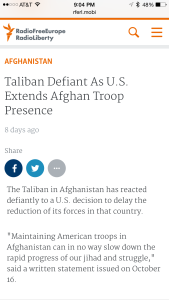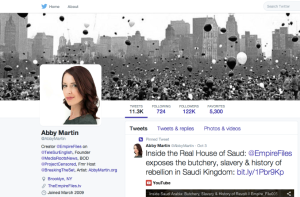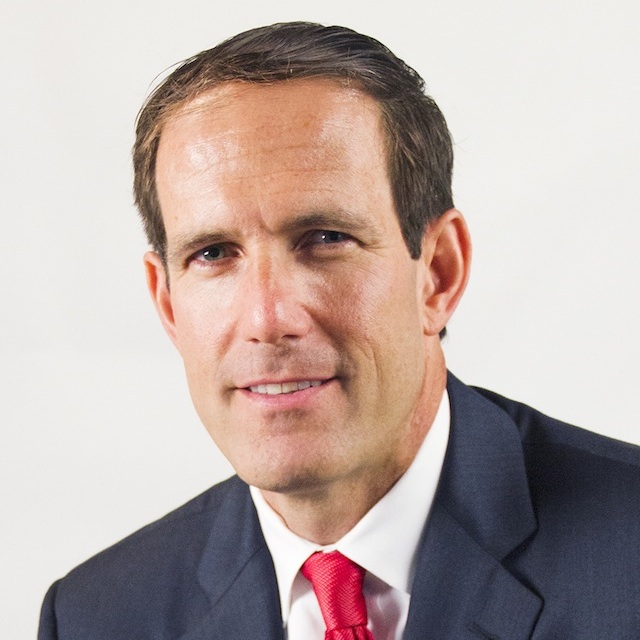BBG Watch Commentary
A Republican member of the bipartisan Broadcasting Board of Governors (BBG), the federal agency in charge of U.S. government-funded media outreach abroad, told U.S. lawmakers last week that BBG-managed Voice of America (VOA) “has always had a fundamental purpose of empowering people through the access to news and information,” and as such is a “fundamental counter to propaganda.” On October 22, 2015, the BBG’s Matt Armstrong participated in a panel of the House Armed Services Committee along with Assistant Secretary of Defense Michael Lumpkin and other experts, but his claims of BBG’s successes in media outreach abroad are contradicted by Internet use and audience engagement statistics, low employee morale at the agency, and criticism from former BBG members, former VOA journalists and others.
“The most serious deficits are in the area of ‘senior leadership’,” a former BBG member who did not want to be identified, told BBG Watch a few weeks before Matt Armstrong’s testimony. The BBG is not in any better shape now, “despite Matt Armstrong’s and Jeff Shell’s [BBG’s Democratic Chairman] “constant assertions that it was always someone else’s fault, but that they have set it all right,” a former high-level BBG official observed.
A former BBG member who also does not want his name to be made public accused the current BBG board of “defaulting to what evidently is its preferred modus operandi of ignoring USIB’s [United States International Broadcasting also referred to United States International Media] real problems while drowning criticism in a torrent of over-inflated bombast trumpeting invisible successes.”
The hearing on October 22, 2015 was titled “Countering Adversarial Propaganda: Charting an Effective Course in the Contested Information Environment.” The hearing was called by the Subcommittee on Emerging Threats and Capabilities (Committee on Armed Services).
While many critics believe Matt Armstrong gave U.S. lawmakers and taxpayers a dangerously misleading picture of the agency by creating an impression that what should have been done is actually being done across the board, a few BBG-employed Voice of America journalists on the U.S. government payroll–although apparently not a majority within VOA and BBG–strongly disagree with his vision of VOA’s mission. Many more question his attempt to present the BBG as a successful operation.
At one extreme end of the spectrum of opinions on what should be the role of U.S. international media outreach, some Voice of America English Newsroom reporters object strongly to even discussing such concepts as “countering” or “messaging” in VOA programs. At a recent BBG meeting in Washington, Jim Malone, a Voice of America journalist since 1983 who works as VOA’s national correspondent (as seen in a VOA video below designed for sharing on social media to explain America to foreign audiences), objected strongly to VOA journalists being asked to engage in countering violent extremism. Some of his VOA English Newsroom colleagues object to BBG officials even discussing on how it could be done. Their current programs, however, with a few exceptions, generate minimal interest or audience engagement abroad.
“WWII Victory Flyover Reaction” – VOA Correspondents Jim Malone and Andre Denesnera (who has since retired) comment on the WW II Victory Flyover on the National Mall, May 8, 2015.
Mr. Malone said that “as a policy goal, I know of no one who would argue with the notion of countering violent extremism.” He added, however, that “the growing focus on and funding of the initiative within VOA and the apparent desire to involve journalists in pursuit of a policy goal casts doubt on our independence and our journalistic integrity.”
In his congressional testimony last week, Mr. Armstrong used the term “honest journalism” while at the same time arguing for close links between VOA and U.S. national security operations. A former VOA English News correspondent described Matt Armstrong’s testimony as “full of spook-speak,” seeming to “emphasize the stuff about honest journalism, but sticking in all kinds of code about changing direction to confront ‘extremist narratives,’ etc.”
Mr. Armstrong also made a number of what appear to be highly exaggerated claims of BBG’s successes. Social media metrics and comments by critics, including Hillary Clinton when she was Secretary of State and an ex officio member of the BBG, tend to contradict a rosy picture of how the BBG and the Voice of America have been performing and are performing now.
In 2013, Hillary Clinton called the BBG “practically defunct” in its ability to tell a message around the world and to engage in the war of ideas. Mrs. Clinton made the statement while she was still Secretary of State and a BBG member. Social media metrics today show that VOA is being vastly outperformed by Russia’s RT, BBC and other international and U.S. media outlets.
The Voice of America English News has about four times fewer Twitter (312,000 as of October 25, 2015) followers than Edward Snowden (1,550,000).
Matt Armstrong, however, has been calling hers and congressional criticism of BBG’s performance “unfair” and “overly harsh.” In his testimony last Thursday, he repeated some of the claims of VOA’s successes, including claimed successes in countering Russian and ISIS propaganda.
“The BBG engages key audiences in Russia, the Russian periphery, and globally to provide them with the realities about Russian, and US activities, and, importantly, their context,” Mr. Armstrong told U.S. lawmakers. He was equally emphatic about the agency being successful in countering extremist groups.
MATT ARMSTRONG: “Our journalism exposes the gap between rhetoric and reality – ideologically and organizationally – of extremist groups. We do this through objective reporting that adheres to the highest standards of professional journalism. By covering violent extremism, we expose it for what it is.”
Few would deny that most of the propaganda generated by the Kremlin is spread online and that extremist groups do their propaganda and recruiting through social media, but Mr. Armstrong’s claims do not seem to be supported to any significant degree by any social media metrics that can be attributed to the BBG. In his testimony, Mr. Armstrong also ignored highly visible signs of VOA’s dysfunctional news operation and management.

 VOA continued to embarrass itself in recent days by not updating news on a number of its websites, posting on Facebook a rather pointless as well as dated video of a Russian bear breaking a shopping center in Siberia (unlike BBC, VOA presented only the official Russian version of this rather marginal news story and misspelled its title), and running a completely insignificant crime story involving sex as a number one U.S. news item on the French to Africa Service website for, not one, but five days in a row, without updating top U.S. news on the site for several days. VOA later removed the U.S. “sex-before-jail,” which was a word-for-word translation of an AFP report with a wrong photo posted by VOA.
VOA continued to embarrass itself in recent days by not updating news on a number of its websites, posting on Facebook a rather pointless as well as dated video of a Russian bear breaking a shopping center in Siberia (unlike BBC, VOA presented only the official Russian version of this rather marginal news story and misspelled its title), and running a completely insignificant crime story involving sex as a number one U.S. news item on the French to Africa Service website for, not one, but five days in a row, without updating top U.S. news on the site for several days. VOA later removed the U.S. “sex-before-jail,” which was a word-for-word translation of an AFP report with a wrong photo posted by VOA.
 In his congressional testimony, Matt Armstrong did not mention that a significant portion of VOA online news content consists of reports from news agencies because VOA lacks resources needed to do more original reporting. Those resources are tied up in the BBG bureaucracy.
In his congressional testimony, Matt Armstrong did not mention that a significant portion of VOA online news content consists of reports from news agencies because VOA lacks resources needed to do more original reporting. Those resources are tied up in the BBG bureaucracy.
VOA also has far fewer experienced reporters it once had. RFE/RL is now experiencing similar problems, although to a smaller degree. Lack of adequate resources often results in perfunctory news reports based on wire services. Voice of America recently overlooked U.S. Ambassador to the UN Samantha Power’s statement on RFE/RL’s imprisoned Azerbaijani journalist Khadija Ismayilova.
VOA English News also recently overlooked the death of British-American historian Robert Conquest, who had exposed Soviet crimes now being whitewashed by President Putin’s propaganda machine, while VOA Russian Service initially had only a short news item on his death, failing to note the significance of his work. At about the same time, the service posted a video on a charity cat fashion show in New York. After BBG Watch pointed it out, VOA Russian Service eventually did an analysis of Robert Conquest’s work.
There are, of course, examples of excellent news reporting and investigative reporting by BBG media outlets, such as this report by RFE/RL which could help to counter Kremlin propaganda and current Russian leaders’ attempts to distort history. Some Voice of America reporters also produce excellent reports and initiate important interviews with newsmakers, but the overall result is uneven and particularly irrelevant on social media. VOA Newsroom is often nearly empty and dark after business hours, and VOA language services lack resources to regularly update their news websites and social media pages.
Since recently, the BBG has new CEO, John Lansing, who may have started to pay attention to the Voice of America, its news, websites and social media pages. He has not been with the agency long enough to measure his impact. Both VOA and RFE/RL have not had permanent directors for many months.
 Contrary to Mr. Armstrong’s testimony, VOA’s audience engagement statistics are dismal at best. Abby Martin, formerly the host of Breaking the Set on RT America network, who in fact had criticized on RT the Russian military intervention in Ukraine and left RT in February 2015, has 122,000 Twitter followers, many of them added while she was at RT; VOA’s Jim Malone has 266 (as of October 25, 2015). Jon Sopel, BBC North America Editor, has 48,000 Twitter followers.
Contrary to Mr. Armstrong’s testimony, VOA’s audience engagement statistics are dismal at best. Abby Martin, formerly the host of Breaking the Set on RT America network, who in fact had criticized on RT the Russian military intervention in Ukraine and left RT in February 2015, has 122,000 Twitter followers, many of them added while she was at RT; VOA’s Jim Malone has 266 (as of October 25, 2015). Jon Sopel, BBC North America Editor, has 48,000 Twitter followers.
One former VOA staffer, who wants to remain anonymous, told BBG Watch that “Jim Malone’s statements before the BBG board and at the recent staff meeting put his views squarely at odds with the prevailing direction of just about everyone at senior levels of government about what the agency needs to be doing.” The former staffer also said that Matt Armstrong’s testimony suggests moves that “would substantively divert the Voice of America from its mission according to the Charter.” Neither Jim Malone nor Matt Armstrong are doing the agency and its mission any favors, according to some former VOA reporters and other former agency staffers.
While there could be a disagreement about what Mr. Armstrong meant by using such terms as “cooperate effectively with other U.S. government agencies,” his claims of BBG’s effectiveness in digital outreach can be easily measured. In his congressional testimony on Thursday, Mr. Armstrong asserted that “the BBG is accelerating our shift toward engaging audiences on digital platforms, especially utilizing the power of video, mobile, and social networks.” Mr. Armstrong has been a BBG member since 2013 and similar claims of accelerating digital outreach aboard have been made by other BBG members and BBG executives already for many years.
Results are less than satisfactory. A VOA English News State Department correspondent has only 39 Twitter followers as of October 25, 2015. A VOA English News White House reporter has 957 Twitter followers, but another VOA White House correspondent only 98. VOA Senate correspondent has 220 Twitter followers. Another VOA English News correspondent we checked from the Twitter feed on the VOA News homepage has 68. Very few have over a thousand Twitter followers worldwide.
Since many VOA foreign language service reporters are also not doing much better on social media, these are not numbers that will win the war against Putin’s propaganda and ISIS’s recruitment.
Middle East bureau chief for RT, Paula Slier, who filed many pro-Kremlin propaganda reports while on assignment in eastern Ukraine, has 19,100 Twitter followers. VOA English News Moscow correspondent Daniel Schearf has 1,093 Twitter followers worldwide. BBC News Moscow correspondent Steve Rosenberg has 24,300 Twitter followers.
A senior VOA Russian Service reporter has a slightly larger number of Twitter followers, 3,133, than many VOA English News reporters, but the service itself has only 55,000 Facebook followers, compared to 404,000 for BBC Russian Service and 381,000 for RFE/RL Russian Service.
The director of Radio Free Europe / Radio Liberty (RFE/RL) Russian Service, Irina Lagunina, has 226 Twitter followers as of October 25, 2015.
Only one among VOA’s foreign and domestic correspondents, Voice of America SE Asia bureau chief Steve Herman has any significant following on Twitter (39,500). He is an exception at VOA, but in a recent blog post Mr. Armstrong presented him as an example of how well the Voice of America is doing.
Al Jazeera Arabic has 6,170,000 Twitter followers. Al Jazeera English has 2,730,000 Twitter followers. BBG’s Alhurra TV News in Arabic to the Arab world has 1,060,000 Twitter followers and BBG’s Radio Sawa in Arabic only 156,000 Twitter followers.
In his testimony, Matt Armstrong made a big deal out of many BBG’s Internet freedom initiatives. VOA’s digital media and “digital freedoms” reporter has 748 Twitter followers for “VOA Digital Freedoms.” The BBC’s Technology Correspondent Rory Cellan-Jones has 148,000 Twitter followers.
In May 2014, Mr. Armstrong rebuked Democrats and Republicans on the House Foreign Affairs Committee who had unanimously approved a BBG reform bill in the committee. He accused them of “dated” and unfair criticism of the agency and its bureaucracy in charge of U.S. international media outreach and described the bipartisan reform bill, proposed by the Chairman of the House Foreign Affairs Committee Rep. Ed Royce (R-CA) and the committee’s Ranking Democrat Rep. Eliot Engel (D-NY), as “less than inarticulate” [sic]. The bill was picked up by the Senate in 2014. A new, slightly modified bipartisan reform bill was introduced in 2015. It still awaits further legislative action. The same group of VOA English Newsroom reporters who spoke against VOA “countering violent extremism,” was also adamantly opposed to the reform bill on the grounds that it would require VOA to promote U.S. foreign policy.
In fairness to Mr. Armstrong, a lot of what he had said last Thursday about what BBG entities do, or more precisely what ideally they should be doing, is true, even if the overall picture of a highly successful agency he presented lawmakers appears highly exaggerated and therefore misleading. Some individual BBG-employed reporters are capable of outstanding work and are, in fact, doing outstanding work. If they are not doing well on social media, it may be because the Voice of America news brand has been damaged by actions or inactions of VOA and BBG executives. If irrelevant news items are posted by Voice of America, it may be because resources, training and leadership are missing or because there is impression that this is what the management wants.
Excellent journalism still found from time to time at VOA does represent a counter to propaganda and violent extremism, as Matt Armstrong claimed, without VOA reporters resorting to propaganda. But the overall agency performance is highly uneven. VOA, and even RFE/RL, sometimes fall for Kremlin propaganda or fail to challenge it adequately. This is largely not the fault of BBG-employed journalists, many of whom are now poorly-paid, poorly-trained and exploited contractors because the BBG bureaucracy — the International Broadcasting Bureau (IBB) has been diverting money to itself. It’s a result of years of dysfunction, mismanagement and waste, which Mr. Armstrong failed to fix since he became a board member in 2013.
###
Testimony of Matt Armstrong
Member, Broadcasting Board of Governors
Before the House Armed Services Committee, Subcommittee on Emerging Threats and Capabilities
October 22, 2015
Mr. Chairman and Members of the Subcommittee, thank you for inviting me to speak to the unique role the Broadcasting Board of Governors (BBG) and United States international media play in advancing our national interests.
I am pleased to join today’s panel alongside my colleagues from the Department of Defense (DoD). It is appropriate, and important, that we remain vigilant to the ways in which information and ideas impact our national security. Every day, around the world, we face adversaries and challengers whose primary weapon is not kinetic, but the expert deployment, and at times active suppression, of information.
In today’s increasingly interconnected world, responding to the global explosion of information must be a key focus of U.S. foreign policy. Each day, the voices and messages of our friends and foes alike travel and impact beyond familiar political borders with the press of a “share” button. Communities and conversations in the digital space are created without limit to a specific geographical area. As technology continues to develop, cross-border communications and dissemination of information will only increase.
While the information revolution offers the world a plethora of opportunity, particularly those who have lacked a voice either locally and on the global stage, it also provides challenges. In just the past five years, we have seen vivid examples where both state and non-state actors have effectively used information to challenge the United States, our values of democracy and freedom, and the very existence of objective truth.
From Crimea, to Syria, Northern Nigeria, and Southeast Asia, propaganda and censorship have resurged in our increasingly networked world to foment hate and confusion, monitor and suppress dissent, activate acts of terror and roll-back hard- won freedoms. Actors from ISIL to Russia to China are using information not just to “win the news cycle,” but to shape the very choices of statecraft.
U.S. foreign policy cannot be effective if we do not appreciate how information shapes the actions of policymakers, institutions, and everyday citizens on the street. The simple truth is that today’s media has the power to reach through the screen to activate audiences to action – or to suppress them. Failing to recognize this fact limits the effectiveness of our foreign policy.
U.S. international media advances U.S. national interests by engaging audiences that are critical to advancing democratic values through open and free exchanges of information.
The BBG oversees all nonmilitary international media supported by the U.S. government, including the Voice of America (VOA), the Office of Cuba Broadcasting (OCB), and BBG-funded grantees Radio Free Europe/Radio Liberty, Inc. (RFE/RL), Radio Free Asia (RFA) and the Middle East Broadcasting Networks, Inc. (MBN). We inform, engage, and connect people around the world in support of freedom and democracy.
Throughout U.S. international media’s long history, the tools and goals have been consistent: delivering consistently accurate, reliable and credible reporting that opens minds and stimulates debate in closed societies and those where free media are not yet fully established – especially where local media fails to inform and empower its citizens.
The mission of the Broadcasting Board of Governors is unique. We are a 24/7 global media organization, built for a global mission. BBG radio, television, Internet, and mobile programs reach more than 215 million people each week, in sixty-one languages.
As a journalism organization, our mission is to empower people with both the truth and the context of local, regional, and global affairs, as well as through news from the United States. Our journalists don’t just present the news, they unpack the news to provide their audiences with a greater understanding of their world and what is happening. Great journalism – the stories that stick with an audience – shows, often indirectly and subtly, how democracies should work. Great journalism helps audiences understand how democratic accountability, rule of law (not rule by law), human rights, and human security should work, and the differences between the vision of democratic ideals and the reality, so that audiences understand the contrast.
The unique difference of the BBG is not only that we do the news in sixty-one different languages, but also that we prioritize our content to impact our strategic audiences. Many of our reporters are not only from our target markets, but they also maintain extensive networks in them and speak as locals. They don’t parachute in. We know the audiences, what they need to know, and how the story is best told. This is what makes the BBG networks, including VOA, unique. We are called upon, as enshrined in our founding legislation, to operate in markets until “private information dissemination is found to be adequate.” Virtually by definition, we target markets that are hard to reach and, at best, under served by accessible reliable independent media. There is no other agency or corporation like us – that puts the audience first, and that actively builds true, independent media markets, in order to one day not be needed. We use future redundancy as a primary measure of success.
President Obama said in his recent speech at the U.N. General Assembly: “The strength of nations depends on the success of their people – their knowledge, their innovation, their imagination, their creativity, their drive, their opportunity – and that, in turn, depends upon individual rights and good governance and personal security.”
By unleashing the power of professional journalism, we open up new markets for independent media and, in doing so, challenge the governments, institutions, and non-state actors who would manipulate facts to limit choice or infringe the rights of their people. Accurate news not only informs the public, it allows individuals to aspire to freedom by offering them a platform from which to make decisions based on what is verifiably true – rather than on what their governments may tell them. In short, by exporting the power of a free press we fuel and sustain the exchange of ideas and the struggle for individual thought and freedom – the very building blocks of democratic freedom.
The VOA Charter, which is enshrined in our enabling legislation, mandates that our programs “present the policies of the United States clearly and effectively, and…also present responsible discussions and opinion on these policies.” In this way we are a part of broader U.S. public diplomacy, a means by which the U.S. Government can articulate and explain its policies and actions, and through which Congress and other constituencies can present alternate views.
Our journalism exposes corruption and abuse, and empowers our audience to root it out. When we cover the success of free and open elections, as we have recently in Nigeria, we educate audiences on how opposition parties can seek power peacefully through the ballot. When we help repressed voices talk about their future, as we do in Iran, we show how communities can solve problems on their own.
And when we train the lens on our own challenges, for example by covering the protests surrounding Ferguson, Missouri and the subsequent national debate on racial equality, the Detroit bankruptcy, or differing views on key foreign policy initiatives, such as the recent negotiations with Iran, we allow the world to see democracy not as an abstraction, but as a constantly evolving work in progress. This reporting shows the strength of our democracy – the identification of problems, the ability to air our differences in peaceful, respectful ways in line with the rule of law – and gives the opportunity to dive into often unfamiliar concepts to our audiences, such as accountability of civil authorities, what a grand jury is, and how a legal system can work. Even talking about how – and why – Americans go about paying parking tickets can open the eyes of our audiences.
Journalism is a powerful force for change. By acting as the “foreign domestic media” we play a critical role in the lives of audiences, as a news source that provides them with information, in their local language and relevant to their daily lives, that helps them make critical decisions. Decisions on their tolerance for local corruption. Decisions on whether to believe disinformation or form an opinion on fact-based information. Decisions on whether to be connected to the world or remain isolated from it.
U.S. International Media and U.S. Foreign Policy
Today, with so much of the world awash in information, the BBG’s role is changing. As our adversaries have embraced the opportunities to engage and influence audiences using new tools and techniques, the BBG has made changes as well.
Our success no longer depends on our unique global reach, but also on the intensity of the BBG’s relationships with its audiences, the extent to which they share and comment on our news and information and, ultimately, how they influence local knowledge and thought.
The impact of U.S. international media for the next decade is based on our ability to be an influential news and information source in this dynamic 21st century information environment. Under the leadership of our new CEO, the BBG is aggressively moving along five core themes to be the 21st century media organization the tax payers – and the Government – demands.
First, the BBG is accelerating our shift toward engaging audiences on digital platforms, especially utilizing the power of video, mobile, and social networks. We must be on the platform, in the format, and providing the content the audience needs – be it radio, television, or mobile tools and social media. To be clear, this is not just one-way dissemination, but also the empowering and encouraging of their participation in the conversations.
Second, we are rapidly expanding coordination and content-sharing across the BBG’s five interdependent networks in order to cover and report on the stories that matter to audiences and markets that increasingly transcend political borders and languages. For instance, this will allow us to more effectively share our coverage of the Middle East with interested audiences in Indonesia and Russia, or issues surrounding Chinese investment in Africa with audiences across Latin America.
Third, the BBG is concentrating its efforts in five key issue areas where we can be most effective in support of our mission. These five areas are Russia; covering violent extremism; the widening regional influence of Iran; China, not only in the South China Sea region, but also in Africa and Latin America; and, the continuing struggle for democratic rights in Cuba.
Fourth, we are evolving to an organization actively engaged in curating, commissioning, and acquiring content. This is about more than just internal capacity. There are new generations of compelling storytellers, such as the youth in many of our markets, documentarians and journalists that engage their peers every day on digital platforms.
Finally, in the past, the BBG was asked to maximize our potential reach, as befitting a broadcasting organization with a broadcasting mentality. We “paid back” the American people whenever we powered up a new transmitter or launched a new program over satellite. Today, we are focusing on impact over reach; specifically by putting the audience first in how we collect, create and distribute news and information.
Now, let me touch upon three key challenges that may be of interest to the Committee.
Responding to Russia
The Kremlin has demonstrated the use of propaganda and disinformation as a tool of foreign policy, as well as maintaining support at home. By doing so, the Kremlin has built a house of cards that is susceptible to the truth and transparency. We see the constant statements and laws to shut down the freedom of speech and the freedom to listen in Russia. We see the same in the Kremlin’s second greatest export – propaganda and obfuscation – that encourages audiences to “Question More” – to the point of not trusting anyone or thinking independently.
Countering Russian propaganda is not a proactive strategy; it is a reactionary posture predisposed to responding to the Kremlin’s initiative. It allows the Kremlin the space to be proactive in disseminating disinformation to distract and obfuscate reality to manufacture blame and mask their own activities.
The BBG engages key audiences in Russia, the Russian periphery, and globally to provide them with the realities about Russian, and US activities, and, importantly, their context. Like elsewhere, we want our audiences to be empowered by facts and to think, to see the ‘say-do’ gaps of their leaders, which we have found over the decades to be a successful strategy for countering propaganda. For instance, RFE/RL continues to ramp up DIGIM, its new social-media driven digital reporting and engagement service, which includes the “Footage vs. Footage” feature, a daily video product that compares and contrasts how Russian media and global media report on the same events, providing the facts of a case and pointing out inconsistencies in Russian reporting.
We engage the audience’s – often silently held – interests and concerns. The fundamental question that Former Soviet Union (FSU) citizens are considering is “Are we headed in the right direction?” They are weighing whether Putin’s political and social reality is where they want to raise their children, start or grow a business, get an education; these are pocketbook and core questions that speak to hopes and dreams. In other words, the future media environment is not just about countering Kremlin propaganda, but a campaign for the future of the region.
Covering Violent Extremism
Extremist narratives too often go unaddressed within local media environments and digital echo chambers. These narratives are often tied to extremists’ alleged religious virtue and organizational invincibility, with a toxic additive of anti- American conspiracy theories.
Our journalism exposes the gap between rhetoric and reality – ideologically and organizationally – of extremist groups. We do this through objective reporting that adheres to the highest standards of professional journalism. By covering violent extremism, we expose it for what it is.
Extremist groups have excelled at re-centering the news cycle on their violence. The BBG offers audiences more than coverage of violence through programming on positive alternative visions for the world to build support for more stable local and regional communities.
While other parts of the government directly support civil society, the BBG is uniquely positioned to elevate moderate voices – from the street to the elites. To cover local issues of concern, and provide constructive outlets for communities to discuss the issues that matter to them. For example, MBN’s 30-minute, weekly documentary series “Delusional Paradise” presents firsthand accounts, obtained through original interviews, of families and communities that have suffered at the hands of ISIL. The program includes compelling accounts of families, in their own words, who have lost loved ones both due to ISIL recruitment and attacks, including the first interview with the Jordanian pilot’s family.
Internet Freedom
A third prominent challenge for us is the fundamental importance of information freedom.
This is an enduring and central role for the BBG. Almost 75 years ago, President Roosevelt gave his ‘Four Freedoms’ speech that symbolized America’s war aims and gave hope to a war-wearied people because they knew they were fighting for freedom. His first freedom was of speech and expression everywhere in the world.
Today information freedom means the freedom for people around the world to be informed, to engage and connect with one another and ultimately use that information to change their lives and the lives of their community for the better.
I have followed, worked on, and blogged about public diplomacy and strategic communication issues for more than a decade. And I’ve been privileged enough to combine these experiences in my work on the Broadcasting Board of Governors.
I recall the rush when early bloggers in formerly closed societies pushed the envelope, and blogged about things their governments would rather see kept quiet.

At the time, there were those who called blogs “the samizdat of the 21st century” – a reference to the underground newsletters self-published by Soviet dissidents during the Cold War. And, for a time, bloggers and independent journalists did do some astounding work in places like Russia, China, Iran, Cuba, Egypt and Azerbaijan.
The BBG created the Internet Anti-Censorship (or “IAC” program) to accomplish two simple goals. The first is to support journalists, bloggers, civil society actors and activists to use the Internet safely and without fear of interference. The second is empower world citizens to have access to modern communication channels that are free of restrictions, and allow them to communicate without fear of repressive censorship or surveillance.
Using funds provided by Congress for internet freedom programs, our International Broadcasting Bureau funds large scale proxy servers and other means to defeat censorship, such as proxy servers like Psiphon. Through the BBG’s investment and supports of multiple circumvention technologies, we have been able to create a new generation of mobile apps that directly challenge and overcome the firewall of Iran and Great Firewall of China. Our web proxy servers allow literally over a billion sessions a day of Internet users from the Middle East, North Africa, Eurasia and East Asia to access news and information outside of their tightly controlled information markets.
Through our Open Technology Fund, we underwrite apps and programs for computers and mobile devices that help to encrypt communications and evade censorship. OTF’s approach to identify and support next-generation internet freedom technologies has led to the development of first-of-its kind tools which support encryption of text messages and mobile phone calls, detection of mobile phone censorship and intrusion efforts, and technologies which allow transfer of data without use of the internet or mobile networks. Such efforts allow users facing changing methods of curtailing free expression online to continue to communicate safely.
The success of our Internet Freedom work is at the core of our role as journalists and reflects our unique capabilities within the U.S. government. In the digital era, the freedom to speak and the freedom to listen remain essential. And you can count on the BBG expanding our efforts in this area into the future.
Cooperation between BBG and Department of Defense
Finally, I would like to turn towards our engagement with other U.S. government colleagues. The BBG has a unique set of capabilities that were enabled by a range of authorities and requirements that first established and then grew U.S. international media. While we do work closely with other parts of government to accomplish our own mission, the Board of Governors and staff at the BBG remain committed to, and strong guardians of, the Agency’s statutory journalistic firewall, which ensures the independence and journalistic integrity of our broadcasts and other content.
Having said this, the BBG does cooperate effectively with other U.S. government agencies, including colleagues at the Department of Defense, Department of State, USAID, and the Centers for Disease Control. We have a number of projects already underway with each agency, and are exploring others where appropriate.
The BBG has worked closely with various different DoD commands to accomplish mutual goals. In an agreement with Africa Command, the Voice of America produced a youth program to understand the impacts of violent extremism among Somalia youth. The radio programming was supplemented by SMS messaging, Town Hall meetings and journalism training for young people.
In Southeast Asia we have executed an agreement with Pacific Command that enabled the BBG to launch a new journalism effort focused on extremism in that region, including Thailand, Indonesia, Bangladesh and Malaysia.
And Voice of America continues to train broadcast technicians and photographers within the combatant commands in the technical aspects of journalism. We are already laying plans to host and train more technical operations staff during the FY 2016 fiscal year.
Conclusion
To close, the fundamental purpose and intent of the BBG is to empower our audiences to own their future. We enable this goal by providing fact-based alternatives to the propaganda they suffer, giving them access to truth, and demonstrating the building blocks of democratic society – accountability, rule of law (versus rule by law), human security issues, and more.
Voice of America’s first broadcast stated: “The news may be good or bad; we will tell you the truth.” At BBG, we continue to operate with that in mind, because truth builds trust and credibility, and delivering credible news is the most effective means to ensure impact and provide the audience with information that will affect their daily lives and use in their own decision-making.
And with that, I am happy to take questions. Thank you for your time and attention.
###
Jim Malone is a senior VOA English correspondent who spoke at the October 8, 2015 BBG meeting. A list of his recent reports can be seen here. Viewed in full desktop format, some of them show their Facebook and Twitter stats, as well as the number of readers’ comments. He has been with VOA since 1983. As of October 25, his VOA English News Twitter account is showing 262 followers.
JIM MALONE REMARKS AT THE U.S. BROADCASTING BOARD OF GOVERNORS
(As prepared for delivery. Please check the video.)
October 8, 2015
Chairman Shell, members of the Board of Governors, CEO Lansing, ladies and gentlemen:
Good morning. My name is Jim Malone. I am a correspondent in the VOA Central Newsroom and have worked at VOA since 1983.
I’m here on behalf of many of my colleagues at VOA who are concerned about our journalistic credibility in connection with the intense focus on the policy initiative known as Countering Violent Extremism, or C-V-E.
Let me be clear. As a policy goal, I know of no one who would argue with the notion of countering violent extremism. But the growing focus on and funding of the initiative within VOA and the apparent desire to involve journalists in pursuit of a policy goal casts doubt on our independence and our journalistic integrity.
In July, senior VOA managers attended a policy retreat focused on “countering violent extremism.” Among the topics: “not every side of a story deserves repeating” and “how broadcast services could approach opportunities to undermine extremism.” How does this conform to the VOA Charter, which is public law, and the VOA Journalistic Code, which says VOA journalists “do not speak for the U.S. government,” and the International Broadcasting Act that requires the BBG board to act as a “firewall” to protect the independence and integrity of VOA journalism?
We take all aspects of the VOA Charter seriously—to be a reliable source of credible news, to represent the diversity of American thought and opinion and to present government policies as well as responsible debate on those policies. In recent months, VOA Central News and the language services have done extensive reporting on the battle against the Islamic State, including many compelling reports from the front lines.
This news focus makes it all the more imperative to keep policy advocacy separate from VOA journalism. We take heart from comments this week from our new CEO, John Lansing, who says he is committed to VOA journalists carrying out their mission according to the VOA Charter, not to act as counter-propagandists.
It was Edward R. Murrow who once said: “To be persuasive we must be believable, to be believable we must be credible, to be credible we must be truthful.”
Murrow’s picture still hangs in the VOA Newsroom, a reminder to all that our mission was, is and should remain credible journalism. Thank you.
From and editorial in the Washington Post on 6-8-14:
“VOA distinguishes itself from state services like Russia Today by embodying the democratic values of independent media and open debate. The United States will never beat China and Russia in the game of official propaganda but it can win the war of ideas, if it doesn’t lose faith in its own principles.”
From an editorial in the New York Times on 5-25-14:
“It is critical that the sponsors guarantee the American public as much as the world that standards of professional journalism will not be sacrificed in favor of a simplistic propaganda megaphone.”
The VOA Charter, which is public law, requires VOA news to be accurate, objective and comprehensive, to represent a balanced and comprehensive representation of American thought and opinion, and to present U.S. policies along with responsible discussion and opinion on those policies. That last requirement has never meant that VOA journalists actively advocate policy in their reports and broadcasts.
Under a law passed by Congress in 1998, the BBG is to act as a “firewall” between VOA journalists and the State Department to “ensure the integrity of VOA journalism.”
And the VOA Journalistic Code says VOA reporters and broadcasters must strive for accuracy and objectivity in their work. “They do not speak for the U.S. government” and they are “careful to preserve the integrity of their organization, strive for excellence and avoid imbalance or bias in their broadcasts.”
###
At the same BBG board meeting on October 8, 2015, Adam Clayton Powell III said he was not responding to Jim Malone’s statement or other statements made during the meeting, but he did provide what could be a countervailing view. Adam Clayton Powell III is an American journalist, media executive, and scholar who currently serves as Director of Washington Policy Initiatives for the University of Southern California and University Fellow at the USC Center on Public Diplomacy.
Adam Clayton Powell III Says Responding to Untrue Propaganda Not Inconsistent With Journalism
ADAM CLAYTON POWELL III REMARKS AT THE US BROADCASTING BOARD OF GOVERNORS
(As prepared for delivery. Please check the video.)
October 8, 2015
Mr. Chairman, Governors, Director Lansing. My name is Adam Clayton Powell III, and I am President of the Public Diplomacy Council and a Senior Fellow at the University of Southern California. But this morning I speak as an individual; the views are my own and not of those or any other institution.
We read of the debate about BBG mission, the debate about how to respond to untrue propaganda, and the debate about what is and isn’t permitted under the VOA charter.
As someone who spent decades at CBS News, NPR and other news organizations, it was always the highest calling of objective journalism to speak truth to power and to spotlight misdeeds wherever they may be. It is therefore the highest calling of objective journalism to draw attention to what is by any objective test illegal and to what is antithetical to the beliefs of women and men of free will.
These are not inconsistent in any way with objective journalism; quite the reverse:
To state the obvious, not everything is true; some things are provably false. Not everything is equivalent; some things are repulsive to humanity.
Today the choice can be very clear. Seizing neighboring countries’ territory by force is not just another ideology. Shooting down civilian airliners, whether a Korean Airlines 747 or Malaysian Airlines 777, is not just another point of view. Jailing political opponents in Havana or Caracas is not just an alternative lifestyle. Mass enslavement of women and girls by ISIS is not just another way of exercising power. Mass kidnapping of African boys and forcing them to become soldiers is not just another way to govern.
These are, by any objective standard, practices which civilized people everywhere can and do condemn. These are, by any objective standard, practices that the best journalism can and should expose, to its credit. These are, by any objective standard, what America opposes.
Your challenge and your opportunity is to state this clearly and forcefully, every day, every hour.
You are the communicators of freedom, in the same tradition that 70 years ago, articulated Freedom of Speech, Freedom of Worship, Freedom from Want, and Freedom from Fear, and in the same tradition that 240 years ago, inspired communicators of freedom to write, “We hold these truths to be self-evident.”
Democracy is not just another ideology.
And freedom is not just another point of view.
Thank you for your time.
###






Comments are closed.